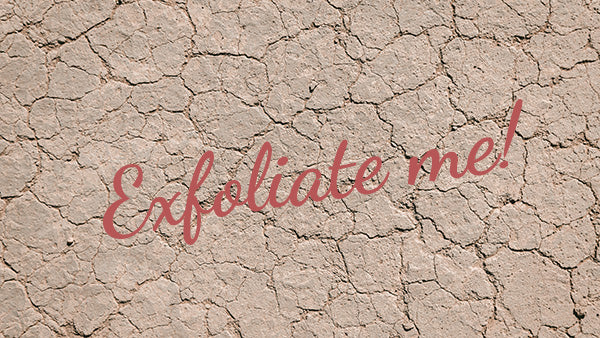
This article sets out to explain what exfoliating is, why it’s important for skincare and the best way to exfoliate your face and body. If you have any further questions, please email me at simon@uxbskincare.com.
Why Exfoliate
Exfoliating is an important part of your skincare routine for a couple of reasons. Firstly, when you remove the topmost layer of dry old skin cells, your skin will look younger and more glowsome (dibbs I invented that word). Secondly, if you let that dry skin stay on your body, any moisturisers or serums you apply are not going to sink in and will likely fly off when you run for the train. In summary:
- You will look glowsome
- You will not waste product and product will sink deeper and be more effective.
Methods of Exfoliation
There are two types of exfoliation:
- mechanical; you use something coarse to rub off the skin
- chemical; you use a chemical to help remove the glue that sticks dead skin cells together
Mechanical exfoliants
Mechanical exfoliants are mainly used on the body where the skin is thicker and can stand up to harsher scrubbing. Areas of the body that usually need a bit of help are knees and elbows but any part of the body can help become glowsome with a bit of scrubbing.
The skin on the body is thicker and dryer because it needs to withstand bending and so can tend towards callusing. Typically mechanical exfoliants come in the form of a shower scrub containing something gritty that’s going to agitate the dead skin. Common exfoliants are:
Regular Salt
some people find it a bit harsh as some edges can cause minor abrasions if used too vigorously. Its mineral content can have a softening effect on the skin.
Himalayan pink salt
This is a rock salt that is more rounded than sea salt and contains a different range of minerals.
Sugar
Sugar scrubs are a soft abrasive that melts into the skin with light water-binding properties.
Sand
Exfoliating sand is often buffed during manufacturing to make it a good body polishing ingredient.
Pumice
Pumice is a volcanic rock that when powdered is a mild lightweight abrasive.
Plastic microbeads
While these man-made beads are good at polishing off dead skin cells, they do not decompose and fish eat them. Avoid.
Crushed walnut shell
A natural abrasive. Some people love it. Some find it too harsh for their skin.
Crushed apricot stones
Similar to Walnuts, a natural ingredient that is well known because of St. Ives scrub (which I actually love).
Olive stones
Olive stones can be crushed to quite a fine paste, so are not quite as scrubby as other natural ingredients.
.
Jojoba beads
Jojoba (pronounced hoh-hoh-bah) beads are natural wax beads that will melt and biodegrade.
Bamboo powder
These are tiny particles of solidified organic silica extracted from bamboo stems. It is also known in India as tabasheer which roughly translated means “bark milk”.
Clay
Clay is essentially tiny porous pieces of rock. It can help exfoliate in two ways. Firstly it draws moisture into the top most layer of the skin aiding natural desquamation. When rubbing the clay from the skin the mechanical action will also remove some skin cells.
Some of these scrubs can be used on the face as well as the body, it really depends how sensitive your skin is.
Dry brushing
Can remove flaky skin that can be used on the face and body. Applying a soft bristled brush on the skin both loosens dead skin cells and increased blood circulation feeding lower levels of the skin.
Chemical exfoliants
Chemical exfoliants work by a method of keratolytic action. They soften the keratin which is the glue between skin cells, loosening them and enabling them to be sloughed off with water. They are typically used on the face and neck.
Alpha Hydroxy Acids (AHA)
Alpha Hydroxy Acids work by breaking down the bonds between surface skin cells. They then can be easily washed away. AHAs also have the ability to hold water in the skin surface making it appear plumper. All common AHAs are derived from natural sources; citric acid (citrus fruits), glycolic acid (sugar cane), lactic acid (sour milk), malic acid (apples), tartaric acid (grapes).
Beta Hydroxy Acids (BHA)
BHAs also work by removing the glue between dead skin cells. Salicylic acid is the best known BHA. It is oil soluble and can penetrate into the pores of the skin aiding removal of dead skin there which can cause acne.
Sulphur
Dissolves the keratin that binds the outer layer of the epidermis together letting the skin cells slough off. It can also dry the skin further helping shedding.
Enzymes
There are two enzymes (papain and bromelain) commonly found in fruits like pineapples that eat away at surface skin bonds helping exfoliation. This is why pineapple juice is sometimes used to tenderise meat!
When or How Often to Exfoliate
For physical exfoliation once a week is usually the optimal amount. Skin naturally sheds every 28 days and this frequency will help it on its way. The best time to exfoliate is when the skin is already soft - so in the bath or shower.
Chemical exfoliation is much gentler on the skin and so can be used more frequently. Those of us with hardier skin can apply a mild (5%) AHA every day. Some may want to skip days to to let the skin rest. Chemical exfoliants are mainly applied at night. They work their magic as you get your beauty sleep allowing you to wake up with a glow. It’s best not to apply these acids to your face in the morning as you will be applying other products on top of them that may cause pilling and all types of exfoliation opens your skin up to sun damage (see the next section).
Warnings about Exfoliation
It is best to stick to a routine that suits your skin with exfoliation. While is is one of the quickest wins with skincare overdoing it can open up your skin to a number of problems.
If you have sensitive skin too much exfoliating can damage the acid mantle of the skin barrier and increase water loss and dehydration. In bad cases deep damage can allow the ingress of bacteria and thus infection. Removing too much dead skin can reveal fresh baby skin that will burn in the sun much much faster. Always wear sunscreen after exfoliating.
Conclusion
Exfoliating is a must-have part of any skincare regime and when used sparingly can really accelerate your path to glowing skin. While it’s tempting to scrub away that grey wrinkled skin, don’t overdo it. Happy desquamation!
